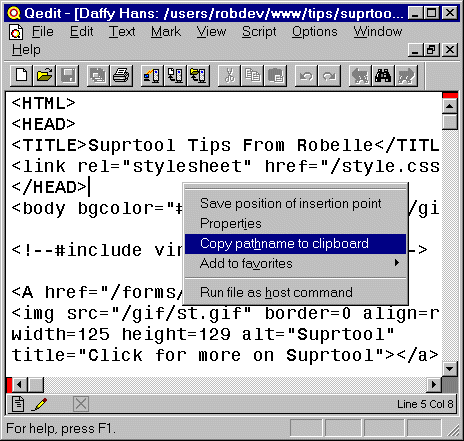Recent News and Tips
OpenSSL consists of implementations of the Secure Sockets Layer (SSL) protocol and the Transport Layer Security (TLS) protocol, a full-strength general purpose cryptography library, and associated command line utilities for encrypting and decrypting files, managing X.509 authentication certificates, composing and validating S/MIME e-mail, and much much more.
This distribution is unsupported freeware that has been ported and packaged by HP for use on MPE/iX. This software has been minimally tested. HP does not guarantee updates or problem fixes for this freeware.
7/30/2001
The July issue of the 3000 NewsWire has an article about Suprtool's
latest enhancement: updating fields from a table of values.
For some time, users have been aggressively asking us how to update a field in a dataset, or even a file, with a value from another file, based on a key. A classic example: Your boss comes to you with a list of new prices for certain parts and asks you to update the Part-Master dataset.
Big News: You can now do this easily in Suprtool. Starting with pre-release 4.4.10, just load the new prices into a Table, index by the product number (prodno), then Extract the price field from each record and replace it with a $lookup on the table.
7/27/2001
The latest Robelle Tech column in the July 2001 issue of the 3000 NewsWire is now
available on the web:
IMAGE is the database of the HP e3000 system, and some knowledge of how it works is useful for anyone doing IT work on the system. “Master Datasets” are one of the storage types of IMAGE and their job is to store records when there is one record expected per unique key field (also the search field). For example, one customer record per customer number.
IMAGE uses a mathematical formula called a hashing algorithm to transfer the key value into a record number within the master dataset. This “hash location” is the first place where IMAGE tries to store the record.
Figure 1 shows a hashing algorithm with a collision occuring in the same block
... click the link above to see Figure 1 and read the rest of the column.
7/26/2001

When dealing with POSIX files (or any files on UNIX), you often
encounter long file name paths which it would be quite difficult
to type accurately by hand. For example,
/users/progdev/projects/01admin/phase1/src/plan.html
or much longer and more obscure "paths" to files!
You can open these files in Qedit for Windows by navigating through
the directory window with your mouse, but often you need to enter
the full file name into a host-command. A typical example is
a CD command to the directory containing the file.
Qedit for Windows has a simple option to make the pathname of
any open file easily accessible. Just Right-Click in the text
window and select Copy pathname to clipboard. Now you
can paste the pathname of your file into a script you are
building, or the QWIN host-command window, or even a terminal emulator
window.

7/25/2001
The pcl2pdf utility converts LaserJet PCL-format files into compact PDF files for Adobe Acrobat.
There are versions for Windows, UNIX and the HP e3000.
The e3000 price is not given on their web site, but the UNIX server price is U$1295.
Enquirers from the United States and Canada should contact Martin Gorfinkel of LARC Computing
(Martin@larc-inc.com), Tel +1 650 941 9310.
Enquirers from the United Kingdom, Europe and other countries should contact Jason Kent
(JasonK@openseas.co.uk) of Open Seas UK Ltd, Tel +44 (0)1865 744 656
Fax +44 (0)1865 742 167
7/24/2001
 There may be times when you need to doing some computation on 1-byte
integers. Although Suprtool allows you to define a 1-byte integer, it gives
you a warning message about how unuseful it is.
There may be times when you need to doing some computation on 1-byte
integers. Although Suprtool allows you to define a 1-byte integer, it gives
you a warning message about how unuseful it is.
define tiny,1,1,integer
Warning: Length of 1 is of limited use for the data type INTEGER
You will find that you cannot do the usual arithmetic operations on these
1-byte integers. The solution is to extra them as 2-byte integers by padding
them with a leading binary zero, then do another pass through the output
file to work with the resulting 2-byte integer. For example, this is what
you would do if you need to add two 1-byte integers together:
input yourfile
define tiny1,1,1
define tiny2,2,1
ext ^0,tiny1, ^0,tiny2
out tmp
xeq
input tmp
define num1,1,2,integer
define num2,3,2,integer
define sum,1,2,integer
ext sum = num1 + num2
out result
xeq
We didn't make "tmp" a self-describing Link file because we
needed to redefine the 4 byte fields as two 2-byte integer
fields in the second pass, so passing on the structure from
the first pass was of limited value. It was clearer and easier to
just Define the num1 and num2 fields from scratch.
dave.lo@robelle.com
7/23/2001
 One common editing function in Visual mode is to copy the same text to several different places. Users often mark the text they want to copy, add it at one place and then go back and mark the original block again. This is not necessary because cut-and-paste operations save the lines they process in a temporary file called "Hold0". To find out how to
copy from the Hold0 file again, click the link above.
One common editing function in Visual mode is to copy the same text to several different places. Users often mark the text they want to copy, add it at one place and then go back and mark the original block again. This is not necessary because cut-and-paste operations save the lines they process in a temporary file called "Hold0". To find out how to
copy from the Hold0 file again, click the link above.
7/19/2001
HP has added an Ordering Guide and a Configuration Guide to their web site, with a great
deal of information on the new servers. This should be a help in planning your upgrades, but
does not replace the formal configuration and quotation process through you HP rep or reseller.
7/18/2001
We have converted our production Suprtool manuals into PDF format and an
excellent HTML Help format. The PDF format is ideal for printing and
the HTML Help format is ideal for browsing and searching.
You can download these files from our web site now:
We are in the process of updating these new doc files for the Suprtool 4.4.1 pre-release and
converting the Host-Based Qedit files into this format. Hopefully this will be more convenient for
our customers.
7/17/2001
To see the penetration of the HP e3000 into the world, visit this list of companies and
organizations that use the HP e3000. It was posted by Jon Backus.
7/13/2001
 We have released the latest version of Suprtool as a beta pre-release.
This version
contains significant performance improvements to $lookup operations and also
has the most requested Suprtool enhancement ever. Read about it by clicking the
link above. To request a copy, email support@robelle.com
We have released the latest version of Suprtool as a beta pre-release.
This version
contains significant performance improvements to $lookup operations and also
has the most requested Suprtool enhancement ever. Read about it by clicking the
link above. To request a copy, email support@robelle.com
7/12/2001
Anthony Ballo (anthony@ecometry.org) alerts us that
there is also a job posting list for Ecometry people located at http://groups.yahoo.com/group/macs-jobs
--
anyone can post a position to the list by emailing macs-jobs@yahoogroups.com
7/11/2001
The 3kworld web site has a section where employers and agencies can post jobs
requiring 3000 experience.
7/09/2001
Interex is the users group for HP servers, both UNIX and MPE. The link above is
to the HP3000 central online web page at Interex. It links to other 3000-related
material on their site.
7/06/2001
Dave Lo's article on
UNIX temp files in
our most recent newsletter
generated quite a bit of feedback on the
Robelle-L discussion list.
First,
Glenn Cole (glenn_cole@non.hp.com) asked:
Under "Unix: Where Are My Temporary Files," it would be nice
to hear the difference between /var/tmp and /tmp. (Actually,
until this note, I did not know that /var/tmp exists!)
and Hans Hendriks of Robelle (hans.hendriks@robelle.com) replied:
According to HP's "HP-UX 10.0 File System Layout White Paper" (at
http://docs.hp.com/hpux/onlinedocs/5963-8942/5963-8942.html) :
/tmp is for "System Generated temporary files", while
/var/tmp is for "Application Generated temporary files"
Further down, they elucidate:
"/tmp is for system-generated temporary files. The contents of /tmp are
usually not preserved across a system reboot. The choice of whether or not
/tmp is cleaned up at boot time is left to the customer.The /tmp directory
is private. Since many sites will delete files from /tmp at boot time, files
that must be preserved should not be placed in the /tmp directory.
Application working files should go in /var/tmp or /var/opt/.
Files generated by the OS that must be preserved across reboots should go
into the /var/tmp directory. "
...And yet further down, under /var/tmp:
"2.2.3.13.12 /var/tmp /var/tmp is for user temporary files generated by
commands in the /usr hierarchy. Files located here are preserved between
system reboots. Temporary files generated by applications installed under
/opt/ will use /var/opt/ for temporary files."
AFAIK, the same structure applies to HP-UX 11.x (but not to 9.x and
older....)
and Ted Ashton (ashted@southern.edu) concluded:
I'd say you're still okay with /tmp. The different flavors of Un*x have
different definitions of /tmp. Some have /var/tmp; some have /usr/tmp; some
have neither, but all have /tmp. With due respect to the docs, if /tmp were
really meant to be strictly for system files, wouldn't it have its permissions
set so that mere mortals couldn't write to it?
7/05/2001
 We are pleased to announce the release of Qedit for Windows
version 5.0.10. Click the link for details on what's new in this version:
We are pleased to announce the release of Qedit for Windows
version 5.0.10. Click the link for details on what's new in this version:
The Favorites command of the File menu allows you to organize and keep track of documents you use most often. You can have all your favorite files in a single list or organize them into folders. You can have multiple folders and a folder can have subfolders.
The Find String dialog box has a number of enhancements. It now offers Search Reverse and Search Forward buttons, which set
the direction of the initial search but are not remembered as the default for the next new search.
It is now easier to select large blocks of text. Place the insertion point at the start of the block and save the position using the Save Position command of the Mark menu. Browse the file to locate the end of the block. Place the cursor at that location and use the Select to Saved Position command of the Mark menu.
Plus many more improvements. You can download this latest version from:
http://www.robelle.com/products/qwin/download.html
As usual, if you have any questions or comments, do not hesitate to
contact us.
François Desrochers, Senior programmer
7/03/2001
 Qedit version 5.1 has been released into production with several valuable new features:
Qedit version 5.1 has been released into production with several valuable new features:
Searching for Multiple Strings: to match lines with more than one string in the same line,
do list "bob" or "sam"
Changing Cobol Tags: to edit the tag area of a COBOL line (columns 73-80), do
changet "bob-june"sam-july"
Specifying a Default Increment: to override Qedit's calculated line number increment when
Texting a large file, do a Set Increment command and then do text bigfile,setincr
Posix command shortcut: to execute a command line through the POSIX shell, precede it with
an exclamation (!).
Full-screen mode: now resets the terminal width when returning to line editing,
recognizes and supports the QCTERM emulator from AICS.
Since we have switched to rolling-updates and multiple releases per year, customers with paid support will receive your
Qedit update on their anniversary date (or sooner).
For more information on this release, read the change document.
7/02/2001
Archived News and Tips...


HP 3000 Book
HP 3000 Evolution:
Edited by
Bob Green of Robelle, from articles written by Robelle,
by The 3000 Newswire, and by other
experts in the HP 3000 field.
This 300-page book contains the latest information on three important
topics:
Homesteading
HP 3000 Tune Up
Migrating a 3000 application.
An essential reference for every desk!
Order your copy on-line for US$25.
